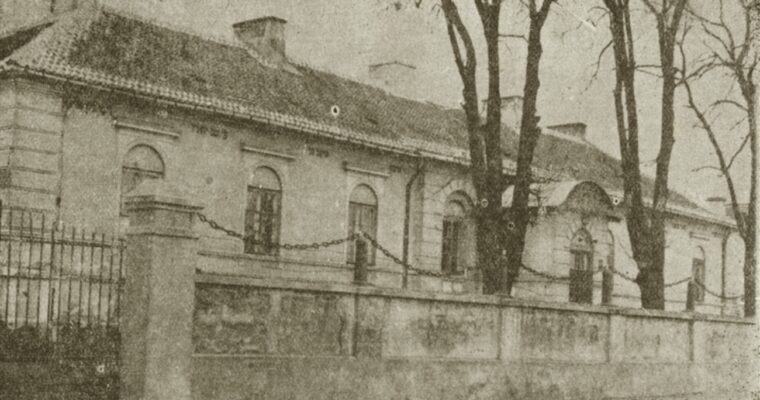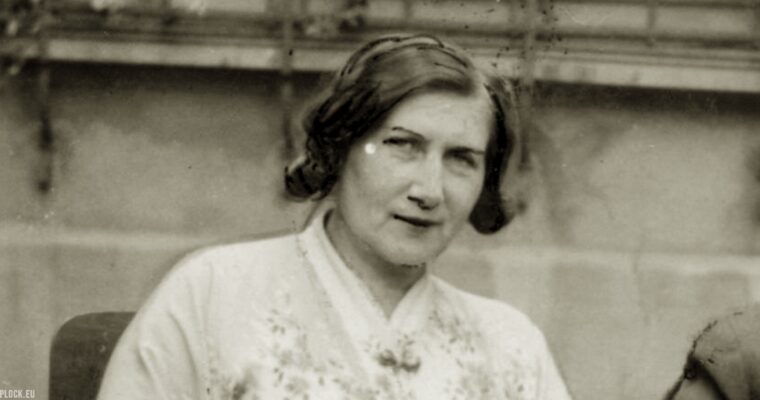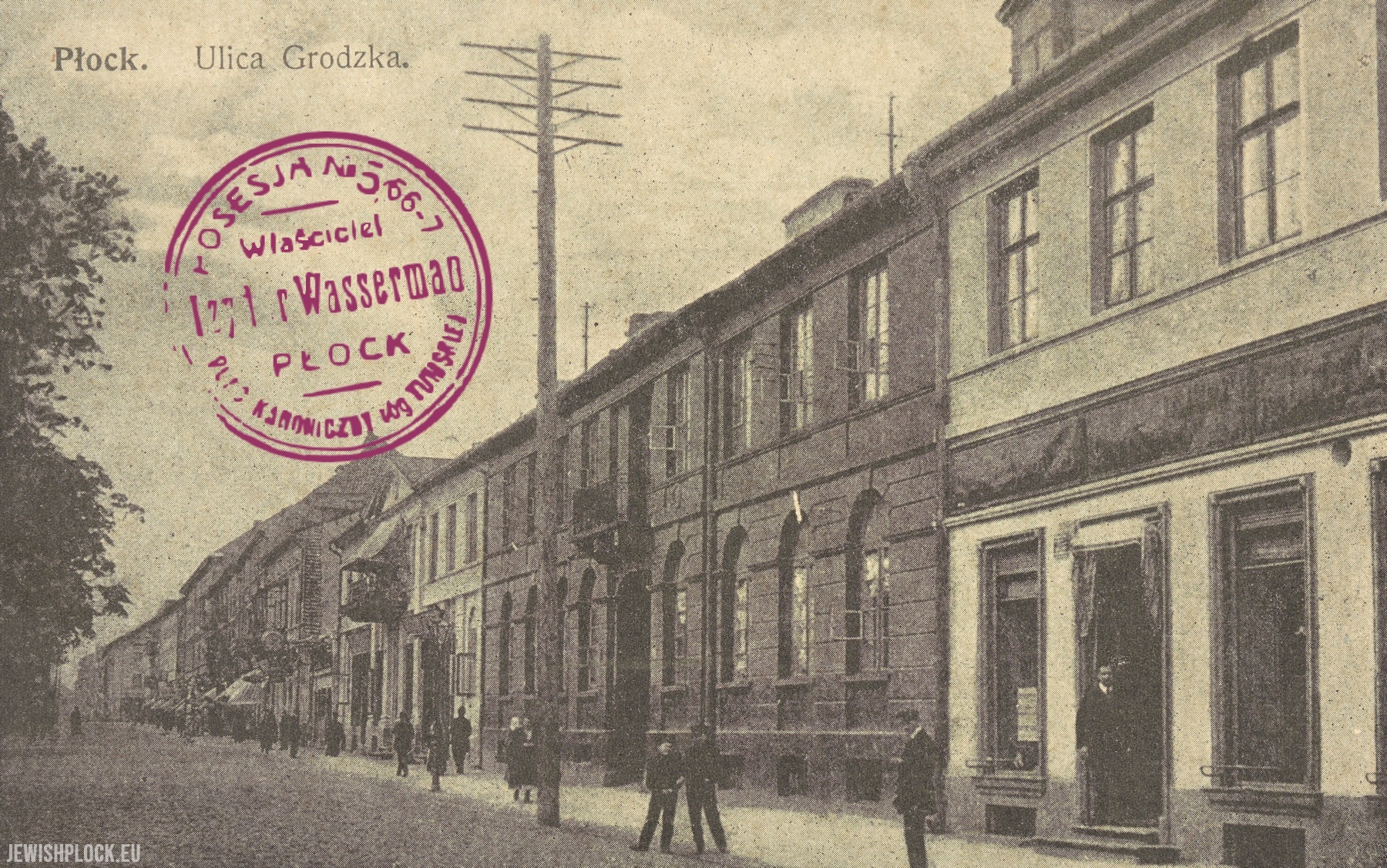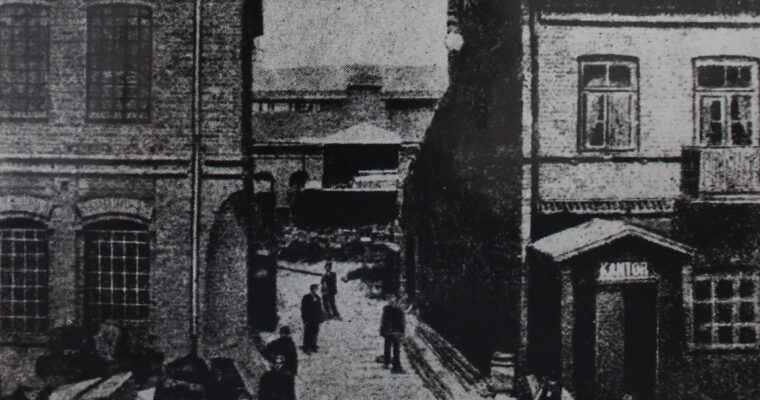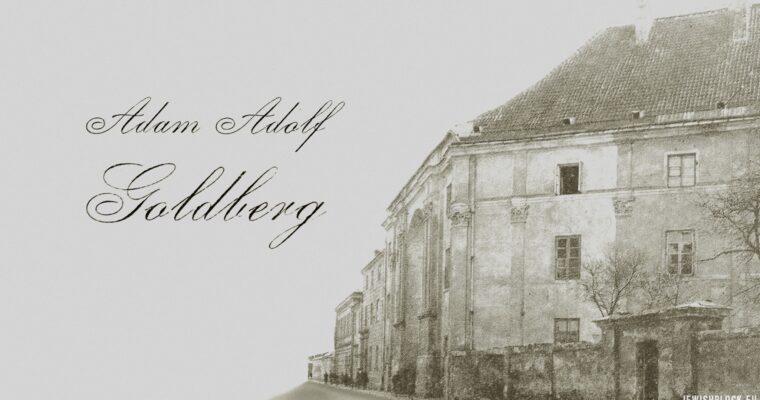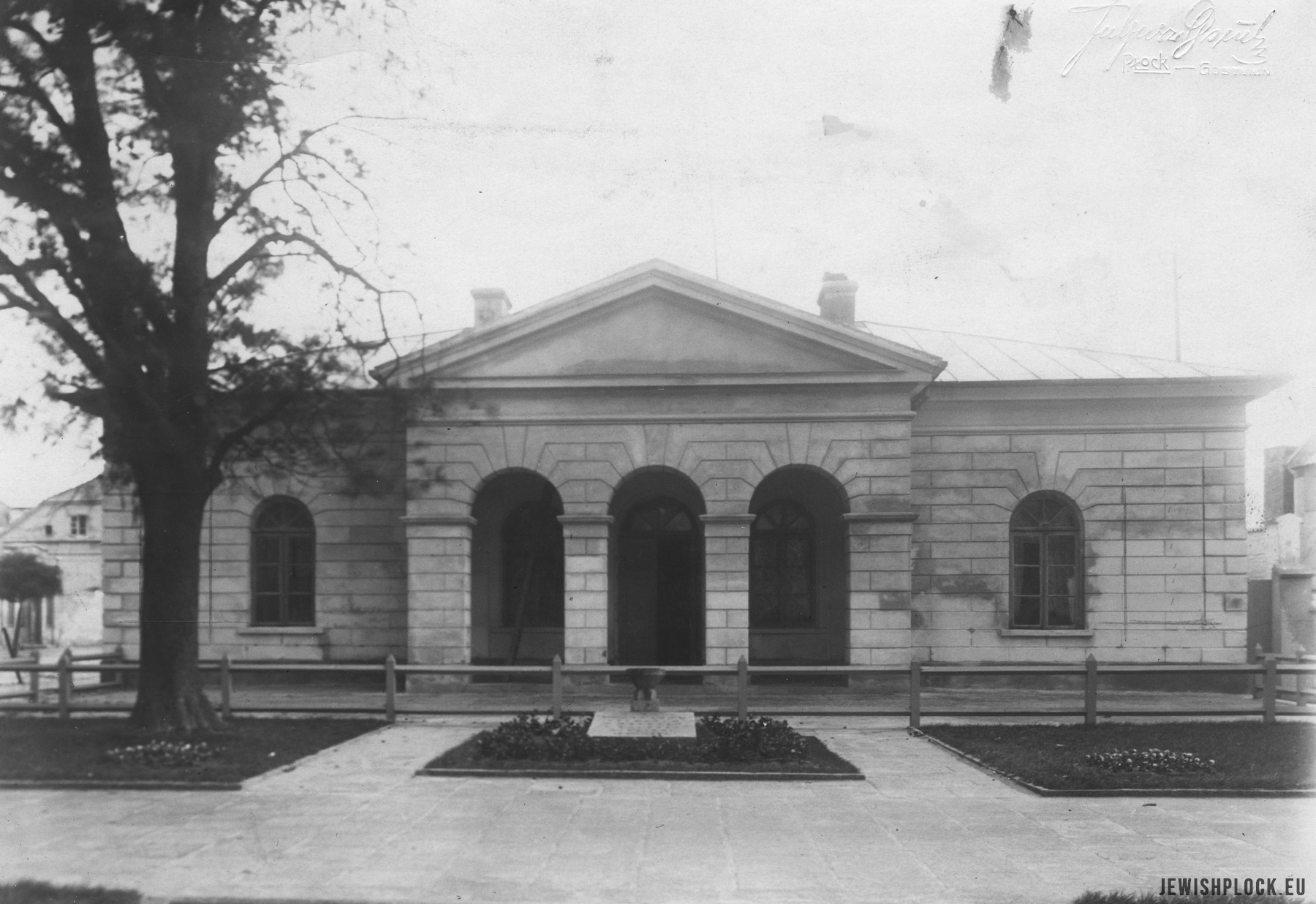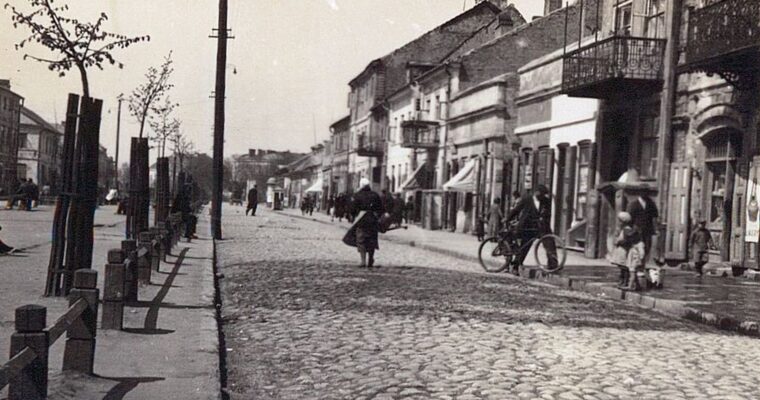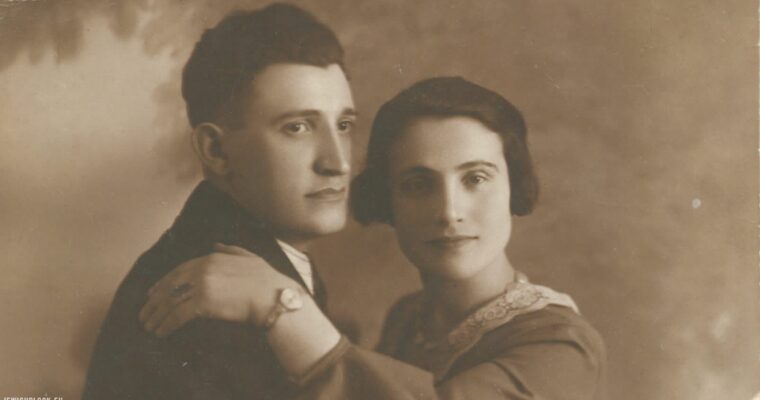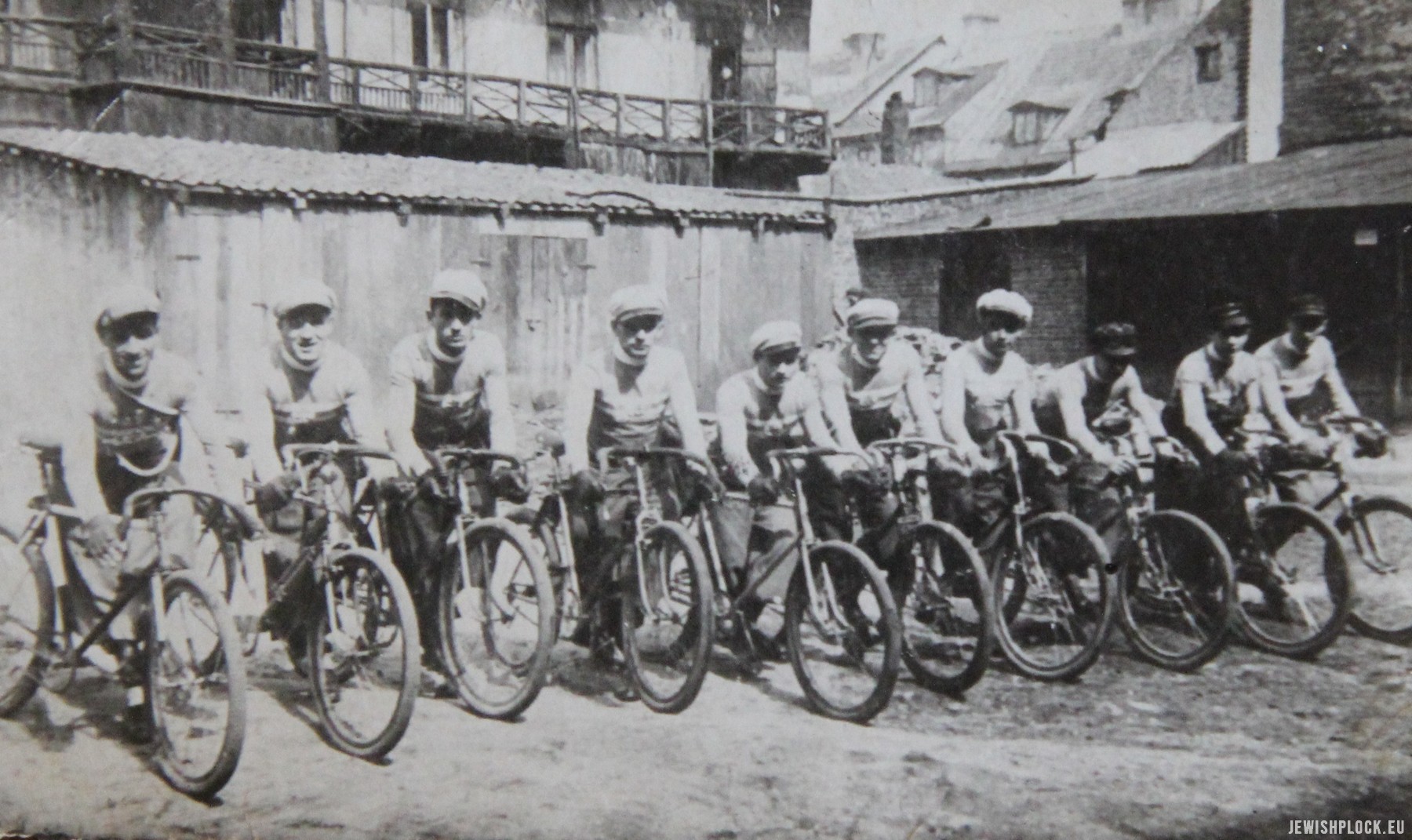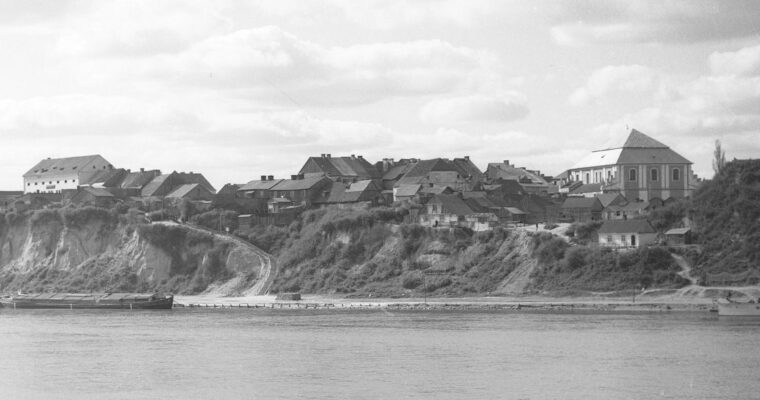The Bolsheviks were attacking the town. We heard artillery shots. They could reach us at any moment. The offices of the military commissariat were on the first floor of our house. Several Polish officers and two Jewish brothers named Narwa worked there. The tenants – Poles took Polish officers, dressed them in civilian clothes and hid the archives. Only the two Jews in uniform remained. My mother took the younger Narwa, a thin and slightly built boy, and dressed him in the student uniform of Stefan, her brother, whom they brought from Czerwińsk with pneumonia. Stefan was sick with a high fever, but if the Russians told him to go with them, he would have nothing to wear. Elder Narwa, a tall, handsome man, wore only a jacket. The Bolsheviks took him. I don’t remember for how many days they were coming to our house. My mother, who knows Russian, explained that this sick person with fever may suffer from some contagious disease and it is better to stay away from him, and the latter is his schoolmate who came to visit him and did not have time to come home. There were three of us: two-year-old Oleś, seven-year-old Mietek and me. The soldiers brought us some bread, they uttered lofty tirades about how they would bring us freedom, how we would live beautifully and happily, how they would establish justice and equality.
After they were forced out of Płock, a pile of murdered people remained at the yard of the “Fara” church. There were brutally murdered, raped, young and old women, tortured bodies of men of all ages, and among them the Narwa boy with eleven stab wounds. I did not see it. My mother did not let me leave the house until the bodies of the murdered and those who died in the fights were removed from the town, but I saw the despair of the younger Narwa when he came to hand over Stefan’s clothes. Then the news spread again that the Haller soldiers shot Rabbi Szapiro, the father of five children, sentenced to death in a quick court procedure for allegedly “giving signs to the Bolsheviks.” The Jewish community fell into mourning. They were afraid of a pogrom. Fortunately, the incidents were limited to beating Jews in the street, breaking windows and looting Jewish shops; there were no deaths during these events.
It was then that two judgments became established in my consciousness: that the Bolsheviks were lying, saying that they acted for the happiness of the poor; that they are barbarians, wild hordes, because in Płock they behaved like Tatars, and that Rabbi Szapiro was shot not because he was a spy, but because he was a Jew.
Róża Holcman
The shooting stopped – the Bolsheviks were forced out of town. As soon as everything calmed down, my father ran to my uncle to find out what was going on […]
Groups of people formed in the street; I walked from one to the other. One woman said:
– Oh my! What have these “Bolsheviks” done, my dear! They robbed all the shops on Szeroka and Jerozolimska streets! My God, I can’t believe people could do such a thing!
I no longer listened to her lamentation, as I reached the other group. Here, a girl in a breathless voice said:
– We barely escaped with our lives … And what they did – they raped all the girls, beat them, robbed them, constantly saying: ”yebut tvoya mat”!
Meanwhile, my pale father came running up and said in a voice trembling with emotion:
– At the Gierszon family place they completely destroyed everything; They took clothes, even children’s and women’s ones, with them, and the wardrobes were chopped up and the pots broken. This is the fate of a Jew![…]
Meanwhile, escapees were coming from all sides of town with small sacks, because on the outskirts of the town the Bolsheviks were even more cruel; they raped women […]
– Do not go to Szeroka Street, because there they are beating Jews – Mrs. Blima told us – and our sister, terribly wounded: they were sitting here hidden in the basement, then a passing Polish soldier told them to leave: – There are children here – they answered – they will leave soon. The soldier, disregarding these words, threw a hand grenade into the basement; it hurt my sister: her face, injured her stomach, ear, and my brother’s arm […]
The history of the Jewish family named G. is terrible. The Bolsheviks killed the father of the family when he defended his daughters, who were all raped and mistreated in front of him. I have no strength to describe all the horrors that happened there, how many tragedies, how many lives were lost…
H. Jakubowicz (Róża Rozenberg),
Source: Ostatnie pokolenie. Autobiografie polskiej młodzieży żydowskiej okresu międzywojennego
ze zbiorów YIVO Insitute for Jewish Reaserch w Nowym Jorku, edition and introduction by A. Cała, Warsaw 2003
On Saturday, August 14, an order was issued for all men aged 17 to 40 to leave Płock and report to the enlistment office (P.K.U.) in Ciechomice on the left bank of the Vistula. On Monday, crowds began to leave the town for Ciechomice. I also left on Monday and spent the night in Radziwie. On Tuesday, Jakub Józef Bursztyn, a watchmaker, a sick man came to Radziwie. I told him I’d take care of him. The previous day three soldiers entered his apartment and plundered it. On Tuesday, Bursztyn, I and many other Jews left Radziwie for Ciechomice. We learned that the P.K.U. was moved to Łąck. In the morning, four Jews left before us: Dawid Elbaum from the Praga district of Warsaw, living in Płock, Liebson, owner of a textile shop at Tumska Street, Szlezyngier, a carpenter from Szeroka Street and Fuks. As we were reaching Łąck, we heard some vague screams. In Łąck, we were stopped by a guard, consisting of two soldiers, who demanded documents. We showed the documents, we said that we were going to the P.K.U., and then one of the soldiers, saying: “They are Jews”, sent us, escorted by his companion, to the P.K.U. This soldier did not know where the P.K.U. was located and led us to some garden, where ca. fifteen soldiers, as well as peasants and girls from the farm service of the Łąck estate were. The soldiers started to beat Bursztyn and came to me, demanding to hand over the weapons. They ordered me to raise my hands up and began to inspect me, they ripped off the backpack, took all its contents, as well as money from their pockets, while they were beaten with a whip. They asked me to take off my shoes. When I said that I would not voluntarily give them up, they knocked me over and took my shoes off violently, still beating me. Bursztyn was also robbed, his jacket was removed and he was beaten more severely than I was. Then an officer came and asked what had happened here. I complained about the soldiers and demanded their arrest. The officer (major), in response to this, ordered the soldier who brought us and all the time watched and remained inactive when they were tormenting us, so that he would lead us to the P.K.U. The soldier obeyed and so we went with the officer. Then I said, “The Russians did not beat me, neither did the Germans, and now I am going to enlist and my own army beat and robbed me”. To this the officer replied: “Shut up, I know what the Jews did in Płock, they shot our army”. He asked whether I can recognize the one who took my shoes from the group of soldiers standing by the road. I replied that it was a different group, and that one stayed in the garden. We went to the P.K.U. There I demanded that the soldier who was leading us be arrested. He was not. They said, that Colonel Zapaśnik was there recently, and told the general that Jews were shooting at his car from the house of Lewensztein (a baptized Jew). The general did not want to believe him, but he swore it was true. I strongly denied it, pointing to it, that all the Jews between the ages of 17 and 40 had left the town. I was answered: “Thank God that you are alive, that you did not suffer the same fate as the four previous Jews.” I was later approached by an enlisted soldier named Kilbert, whom I known, and he told me that terrible screams had been heard half an hour ago. He learned from two Jewish soldiers that Elbaum (who wrapped himself in tallit before his death) was killed, the other three of his companions are badly wounded, they are in the hospital, some even say that they have died. During Thursday, 10-15 Jewish recruits with wounded heads came to the P.K.U. They were all injured by soldiers and peasants. I went to the colonel at two o’clock, but seeing that the wounded were still being brought from Płock, I did not want to disturb him with my case. There I met the commander of the Civic Guard from Płock, Mr. Cygański, who introduced me to 2nd Lt. Ostrowski. This one gave me shoes. When I was still in the P.K.U. Judge Krętowski, Judge Momentowicz, notary Tyc and Karczewski, owner of the Drobin estate arrived. I told them what happened to me. Momentowicz asked me if I knew that our army was being shot at from Lewensztein’s house, from Goldkind’s apartment (who was interned by the authorities). I indignantly denied it. The major who saved me came in the evening with the doctor and said he had ordered an investigation because of these incidents. He was somewhat concerned. Meanwhile, the following incidents took place in Płock (Tadeusz Brombergier told me about them): Płock was taken over by the Bolsheviks in less than a day. The Bolsheviks robbed mostly Jews in the town, many apartments were devastated, they also say that they killed some Jews. Fights took place in the streets.
Natan Graubard
On 12 July, in the face of the incoming Bolshevik danger, the authorities of the Jewish commune of Płock issued the following statement:
“As one man, we, the children of this land, must stand together to defend the country. Anyone strong and healthy enough must fight the enemy, all of those who cannot take part in combat, must serve in the field of social work and offer their own property for the Homeland”.
The Jewish commune established a committee with three departments: of recruitment, aid for soldiers and care of the hospital. However, before the committee managed to expand its activities, repressions fell on its most active members: Dr. Mieczysław Themerson was arrested and held in prison for almost four weeks, as well as the councilor, former vice-president of the Town Council, engineer Izydor Sarna and banker Adolf Rogozik. These arrests had a depressing effect on the committee, but a sewing room was established and underwear was collected. Jewish students and officials volunteered for the army.
On August 18, in the morning a strong cannonade was heard in Płock. It was said that the Bolsheviks were setting up cannons just outside Płock, in Winiary. At one o’clock, the clerk aand the head of the district office, who had evacuated from Płock, having obtained information from the military authorities, reassured the vice-president of the town, saying that everything was going well, that the offensive of the Polish army was developing successfully. People were forced to work all morning. At three, the Bolsheviks, having walked around and surrounded the group leading the offensive, unexpectedly stormed Płock. This caused panic and confusion.
The Bolsheviks took almost half of the town without firing a shot: the streets of the Jewish quarter, the Old Market Square and the streets adjoining it. The Polish soldiers stopped the attack and started to defend themselves on the barricades, protecting access to the Vistula and the bridge. The Bolsheviks walked along the avenues around the town, surrounding it in a semi-circle. Separate groups of soldiers appeared on the outskirts of the town from all sides. There was uninterrupted shooting in the streets. The population was hid in the basements, but there were also those who helped the fighting Polish soldiers. In the chaos of street fighting, the Bolsheviks began to enter apartments, claiming that shots were fired from the windows, and without any excuses they robbed shops, beating those, who opposed them. Women were raped as well. A Jew named G. was killed in defense of his daughters. It was mainly the Jewish quarter and the outskirts of the town that suffered. Surrounding the Bolsheviks, there were the mob, prostitutes, pimps, guards, street men who showed the Bolsheviks around and showed them who to rob. Fighting in the streets was chaotic. The soldiers settled in corner houses, in gates, behind barricades built on the streets leading to the Vistula. The soldiers located themselves in the Lewenstein house, on the corner of Tumska and Warszawska Streets, and fired from the windows. Lewenstein himself helped the wounded and worked throughout the fight.
Jews took part in the defense of Płock. A Jewish officer defended the barricades at the corner of Grodzka Street and the Kanoniczny Square. In the same square, girls gathered abandoned ammunition pouches, while being fired at. Jews hid soldiers. They could not take part in a more active way, because the Jewish quarter was occupied by the Bolsheviks, who terrorized the Jewish population with robberies and rapes. Not even a home for the disabled, a Jewish cooperative, or an old people’s home were spared. The fight in the streets lasted all night. A dozen or so Jews, both soldiers and civilians, died during the fights. Reinforcements finally arrived, and the artillery set up on the left bank of the Vistula, in Radziwie, began to operate. An airplane appeared and on August 19 at noon the Bolsheviks were forced to withdraw from the town.
Soldiers came to the Jewish district and started looking for Bolsheviks there. They entered the houses under the claim, that shots were fired from the windows, beating and robbing people. A group of soldiers entered the apartment of a Jew named Jeruchemson, shouting that smeone shot them from his window. They searched but found no weapons. They then went to search all the apartments and took Jeruchemson with them, even though he was not the owner of the house. Shell casings were found on the third floor in the apartment of the wife of a Russian officer, who was in Russia throughout the war. It was enough to arrest Jeruchemson and severely beat him. The same crowd that was walking with the Bolsheviks was now accompanying the soldiers. Even in the synagogue they were looking for Bolsheviks. The silver goblet used in the service was lost, and the maid’s shoes were taken away as well. Soldiers came to Rudolf Oberfeld, a well-known assimilation activist, and screamed that he was pouring boiling water over the soldiers. They entered other Jewish apartments under the same excuse. There was fear of a pogrom. The juror Alfred Blay went to the voivode of Warsaw, who came to Płock, and pointed out to him that there were visible attempts to provoke certain actions against the Jews. The voivode took this report very seriously and emphasized that all measures must be taken to prevent a pogrom. On Friday, August 20, when the robberies continued and the rumor of boiling water was still circulating, an appeal was issued to the public with signatures, threatening with severe penalties for the robberies. Patrols were dispatched to the Jewish quarter, the gendarmes began to arrest the soldiers who were robbing, Jewish shops were closed, and Jews did not show up in the streets.
The effects of rumors and agitation that the Jews of Płock poured boiling water on soldiers and shot at them were suffered by men evacuated from Płock from 17 to 40 years old, who went on foot to enlist in the P.K.U. in Łąck. Groups of soldiers and farmers attacked the Jews they encountered, severely beat and robbed them.
On August 24, tzadik Chaim Szpiro was arrested. He was accused that on August 18 he stood on the balcony of his apartment on Królewiecka Street and gave signs to the approaching Bolsheviks. He died wrapped in a tallit, turning his back to the shooting soldiers, in order to follow the commandment of the Talmud and not see his fellow people when they lose their “divine face”.
At the session of the Town Council on August 31, 1920, at which the position of the Jewish population during the Bolshevik invasion in Płock was discussed, a resolution was adopted stating that the general Jewish population behaved loyally towards Polish soldiers and did not show sympathy for the Bolsheviks, who robbed and tortured them just like the Christian population.
Source: Inwazja bolszewicka a Żydzi. Zbiór dokumentów, z. 1, Warsaw 1921.
